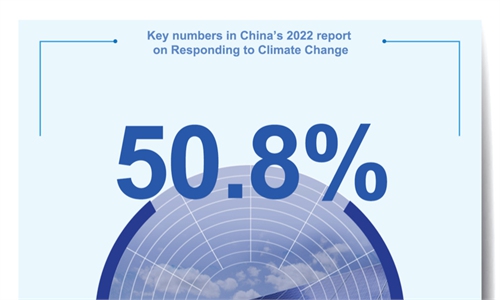Coping with climate change must not fall into Washington's 'confrontation list': Global Times editorial

A logo of the COP 27 summit. Photo: Xinhua
The 2022 UN Climate Change Conference (COP27) is being held in the Egyptian city of Sharm el-Sheikh from November 6 to 18. During the year since the Glasgow Climate Change Conference was held, the climate crisis has further intensified, and many parts of the world have been hit hard by extreme weather and natural disasters. At the same time, the world is facing multiple challenges such as energy crisis, food crisis and high inflation. Some developed countries have shaken their positions on climate change issues. Egypt, the host of COP27, admitted the conference will be the most difficult one in at least one decade.At the Glasgow Conference last year, all parties reached a consensus on the implementation details of the Paris Agreement following difficult negotiations. At the Copenhagen Climate Change Conference in 2009, developed countries pledged to provide developing countries with $100 billion in climate funding each year by 2020. But for more than one decade, even with all kinds of "making up," these investment commitments are far from being fulfilled. Among them, the US has only completed less than 20 percent of its due share, and Australia, Canada and other countries haven't even fulfilled half of their commitments. Dunning developed countries for payment has almost become a key topic of the annual climate summit, but it has repeatedly become a "hide-and-seek" game. Developed countries, especially the US, are keen to say good things and use new promises to cover up the "failure" of their old promises. Therefore, Egypt adopted in a timely manner the slogan of "Together for Implementation," calling on all countries to implement their previous commitments on climate change.
It should be said that addressing the issue of climate financing, especially the fulfillment of financial commitments made by developed countries, is the consensus of most countries at the conference, and it is an "overriding" topic. In an interview, UN Secretary-General António Guterres made a serious warning that rich countries must sign a "historic pact" with the poor ones on the climate, or "we will be doomed." In addition, the issue of "loss and damage" (for the purpose of discussing the compensation provided by advanced industrial countries to developing countries suffering from climate change), which has been boycotted by developed countries such as the US, will be discussed for the first time at this ongoing conference, with the efforts of countries such as the host country Egypt as well as Pakistan, the rotating presidency of the Group of 77 (G77) and China.
Before departing for COP27, US Special Presidential Envoy for Climate John Kerry indicated that the US is "open" to multilateral discussions on the issue. If Kerry's statement is sincere and the US intends to take real actions, it is a positive sign that will be welcomed by the international community. But it is noteworthy that this act, which is supposed to be its historical responsibility, has turned into a "good reason" to besiege China in Washington's calculations. Not only did the US media say that the US was trying to aim China and make China pay for it, but some US scholars also said that this was to drive a wedge between China and other developing countries to split the G77 group. Some developing countries are worried about such manipulation by the US.
Since the Biden administration took office, it has been trying to define its relations with China in terms of the "Competition, Cooperation and Confrontation" (3Cs), and climate change has been listed as one of the few areas where "cooperation" is deemed possible. But now, even this "cooperation" issue has been secretly dragged into the list of "confrontation" by Washington, which reveals the essence of the so-called 3Cs positioning and the malice behind it to contain and suppress China. There are even calls in the US that it is time to "fight China" on the issue of climate change. In their view, competing with China rather than cooperating with China, and engaging in the "green competition," is conducive to the development of the clean energy industry in the US, and helps the US to "influence" its partners across the globe, which is an important area that can "win" over China.
It has been said previously that climate change cooperation is an "oasis" between China and the US. It is also an "oasis" for global cooperation. Now that the "oasis" between the two sides has been destroyed by US' provocation, will Washington let the harmful behaviors of "competition" and confrontation destroy the global "oasis"? The damage caused by Washington's paranoid "competitive" and confrontational tactics in the world economy has been fully demonstrated. If the US is allowed to put the "competition" into the field of climate change that is related to the global common destiny, it will inevitably have serious consequences, which deserves everyone's vigilance and resistance.



